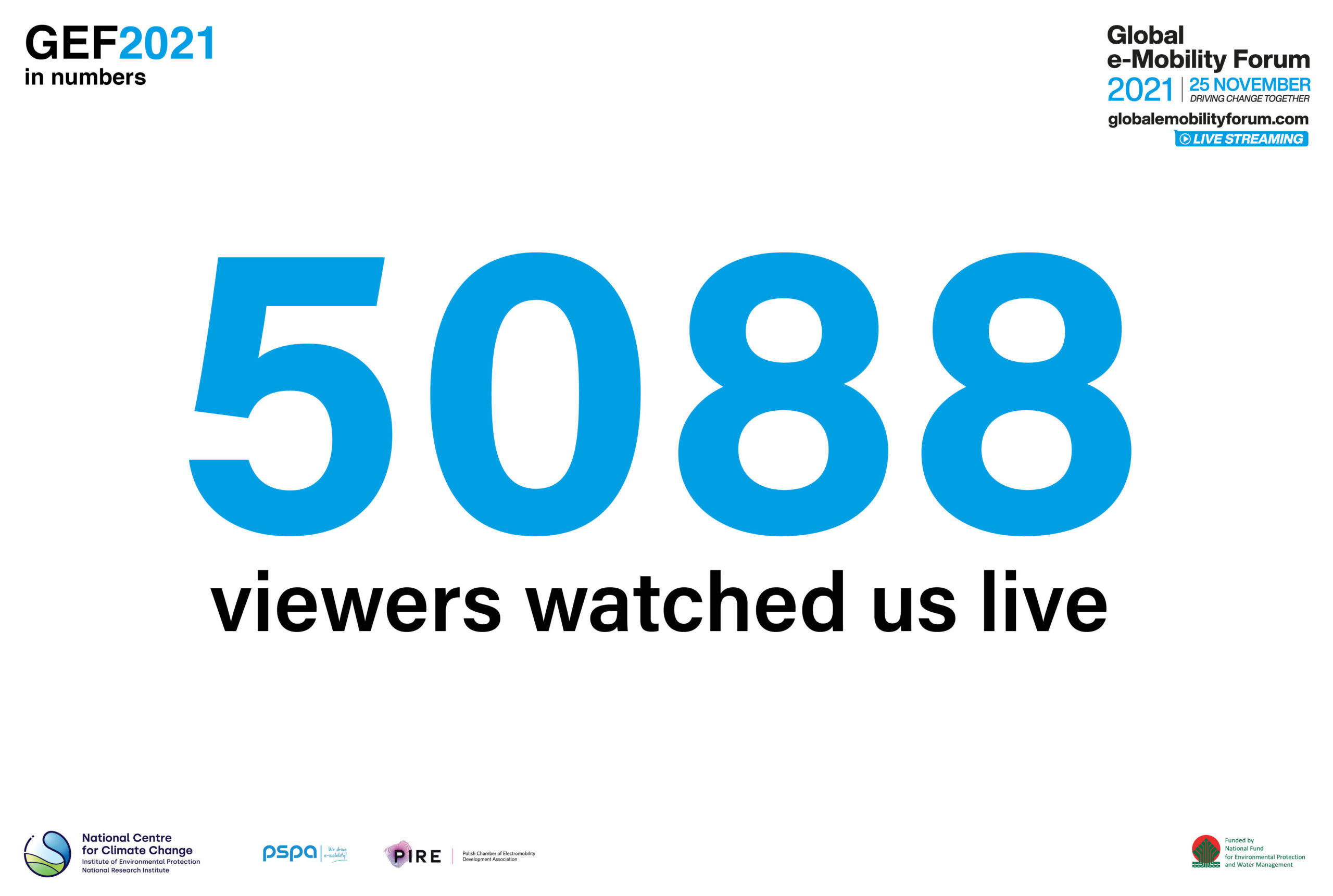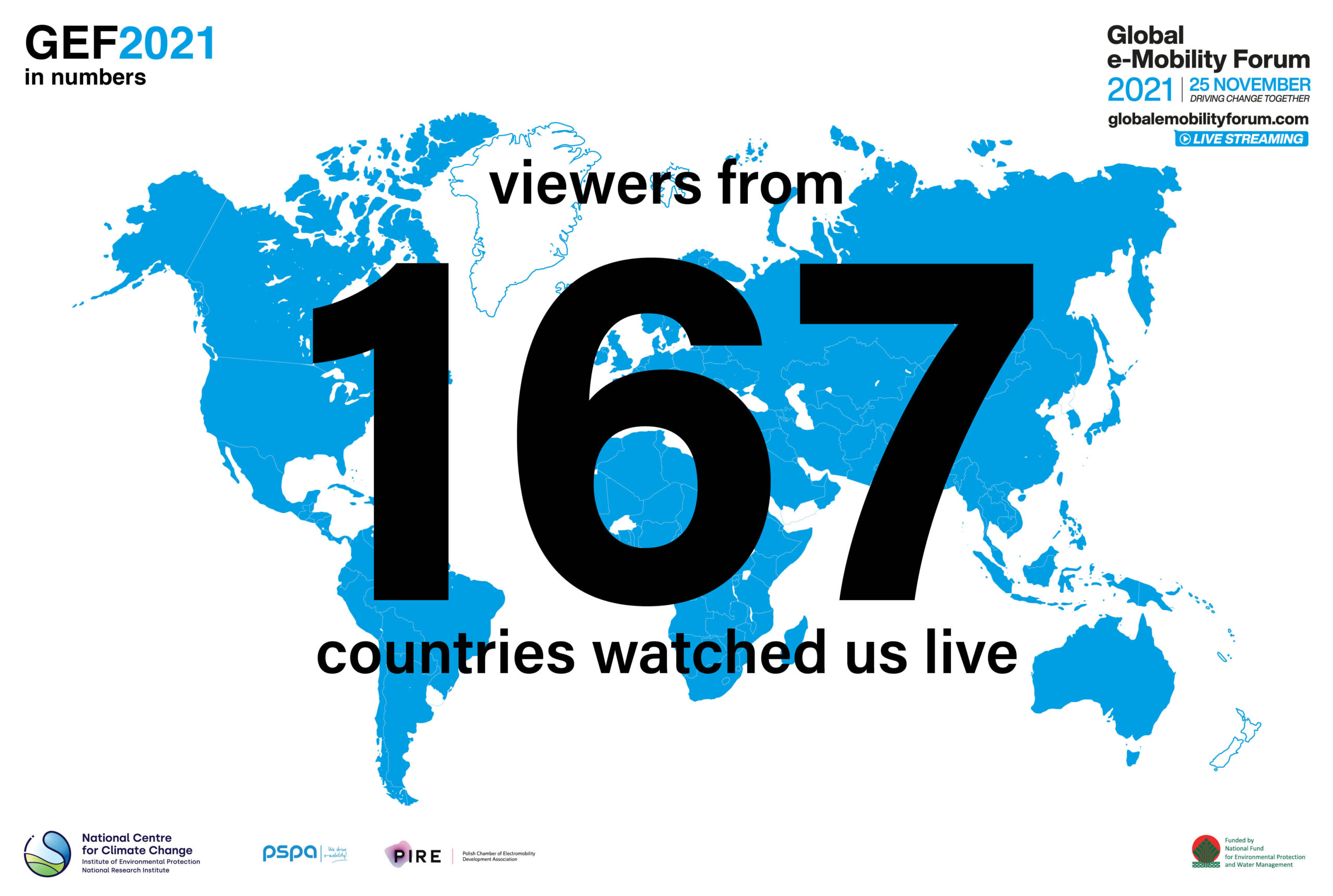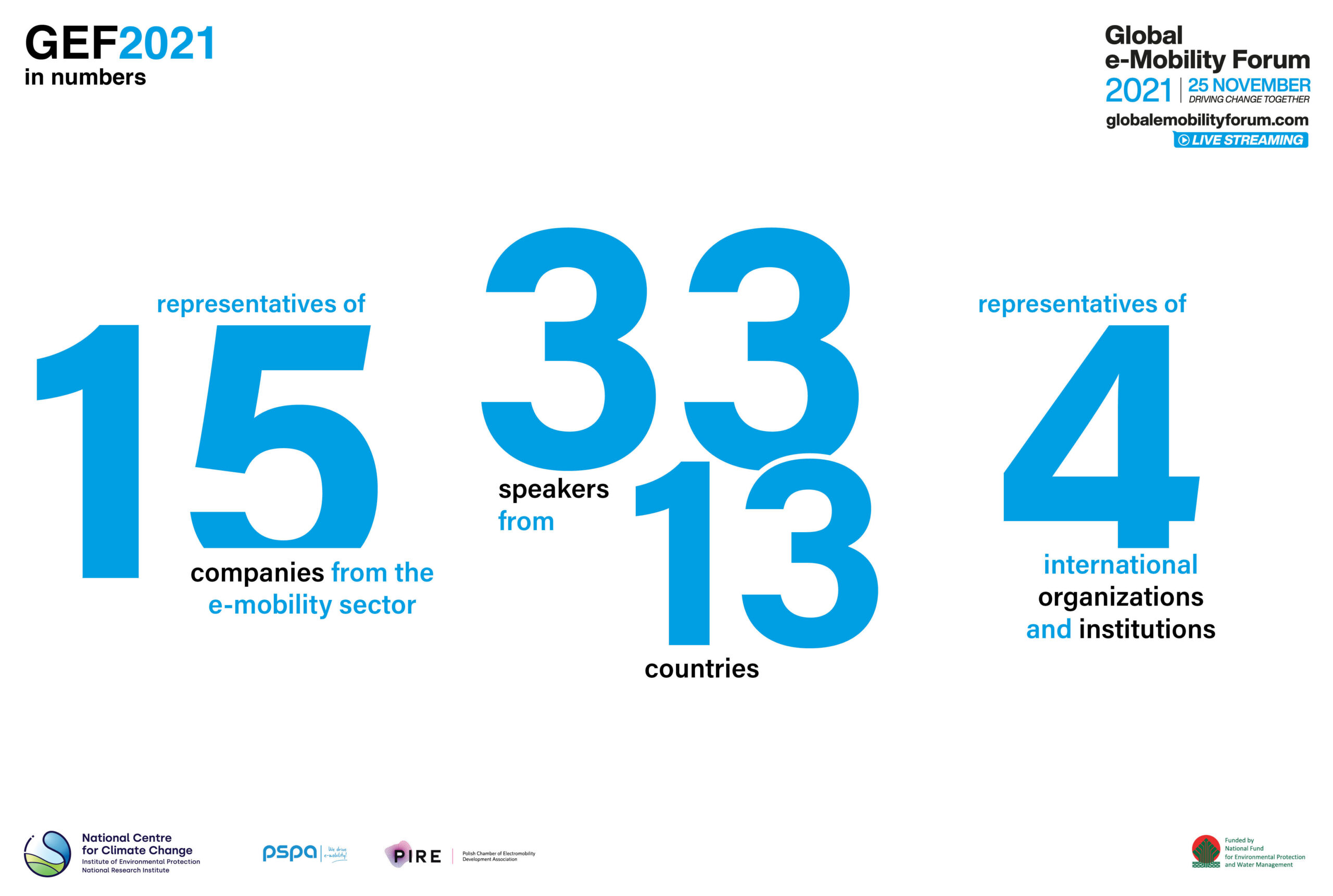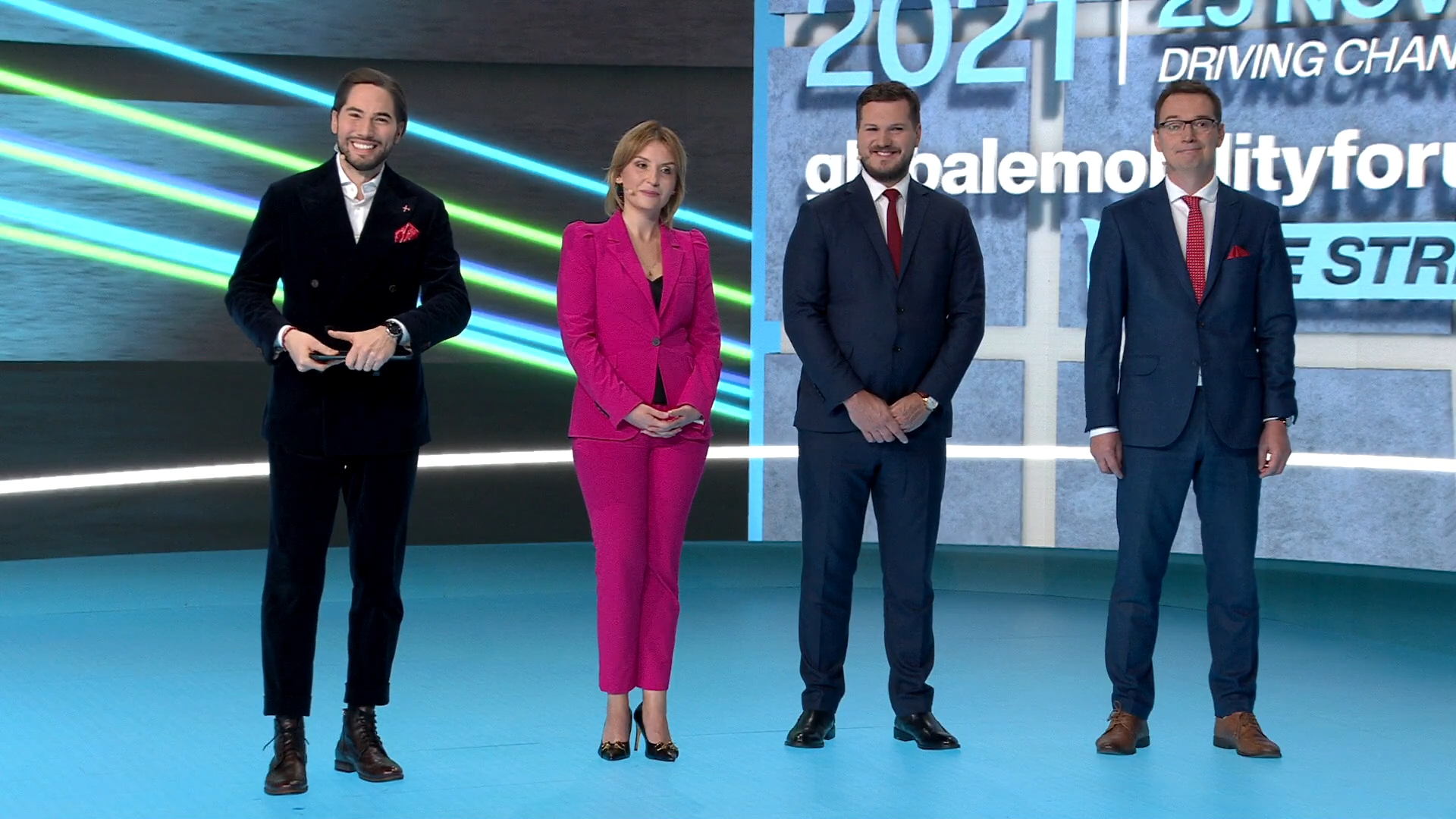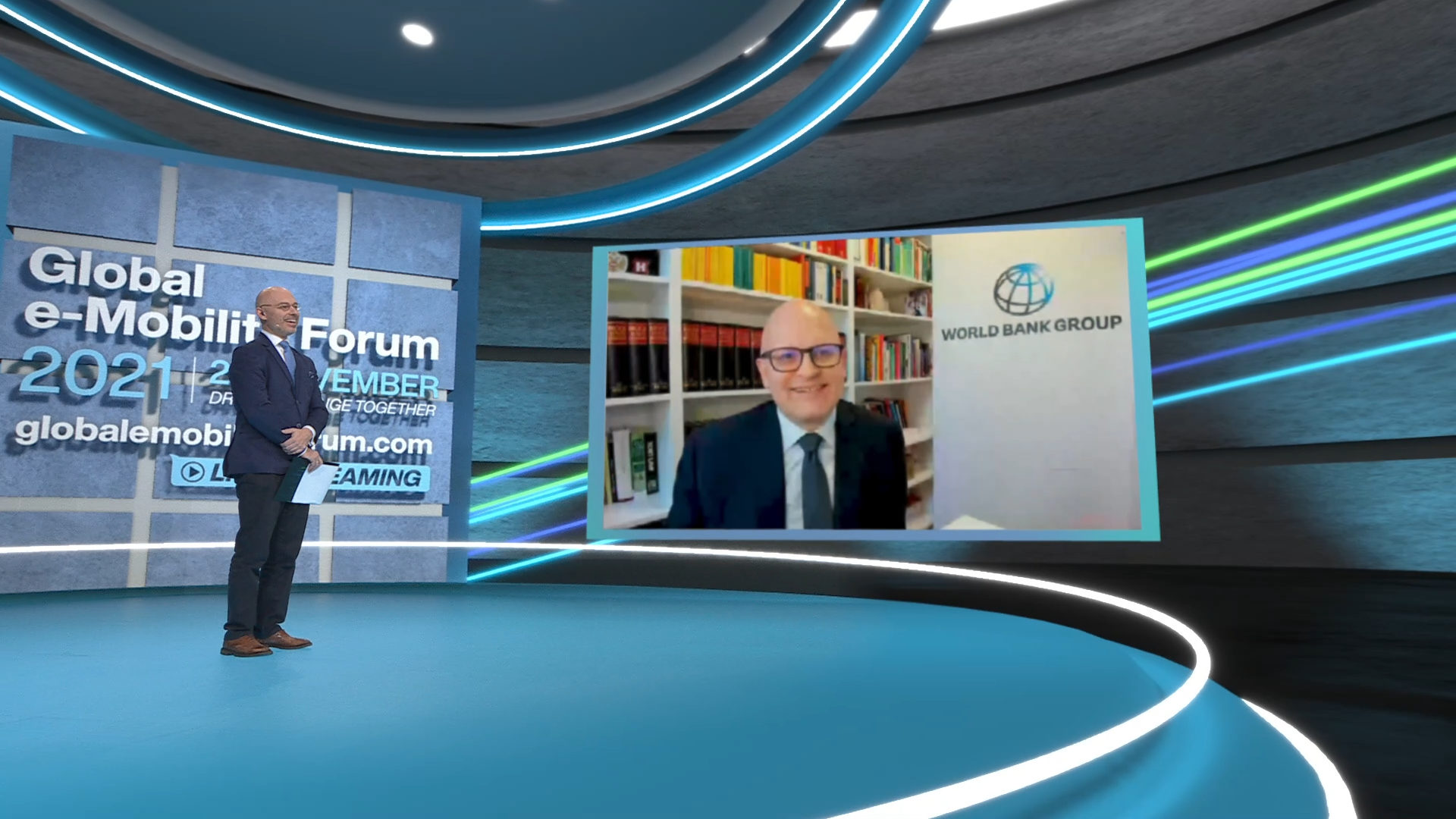Global e-Mobility Forum – Driving Change Together 2021 was one of the largest events of this type worldwide, with over 5 088 participants from 167 countries. The Forum was organized by National Centre for Climate Change in Poland, in partnership with Polish Chamber of Electromobility Development Association (PIRE) and Polish Alternative Fuels Association (PSPA), under the patronage of Prime Minister of Poland Mateusz Morawiecki, Ministry of Climate and Environment of Poland, Adina Vălean – European Commissioner for Transport, The World Bank and European Investment Bank.
The Forum gathered representatives of countries, regions, and cities, NGOs and business as well as sustainable transport experts, to debate about how changes in education can help take advantage of growth opportunities provided by e-mobility.
The conference was opened by President of COP24 and former Minister of Climate and Environment of Poland Michał Kurtyka, who presented an overview of Poland’s achievements in the shift towards e-mobility. – Initially, when we started transforming towards e-mobility, we bet heavily on industrial capabilities and on public transport – those bets are now paying off. Let me just quote two figures. In 2017, Poland produced 10 percent of new electric busses in the EU – in 2020, this share rose to as much as 46 percent. This means that nearly 1 in 2 new buses in the EU is now made in Poland – he emphasized.
– Another number that is very impressive concerns the production lithium-ion batteries: Poland has become a European hub in this regard. Last year we exported 4 billion euros worth of lithium-ion batteries – twice as much as the year before – added Kurtyka.
Kurtyka also emphasized that electromobility is growing in a number of regions whose economy has traditionally depended heavily on fossil fuels – which means that it can be not only an engine of economic growth, but also a tool of Just Transition.
– In 2017, the automotive sector was estimated to have 14 million directly employed workers globally with four or five times as many in the supply chain. This number could increase by ca. 2.5 million by 2030 due to the transition to e-mobility – said Mathias Cormann, Secretary-General of Organisation for Economic Co-operation and Development. – A skills shortage is already emerging. In October, the UK’s Institute of the Motor Industry estimated that only 6.5 percent of active mechanics are currently qualified to work on electric vehicles. Therefore, there could be a shortfall of over 37 000 electric vehicle technicians by 2030 – he warned.
– At the World Bank, we work on e-mobility all over the world because of its huge potential, which goes beyond the obvious value of decarbonization. It is about jobs, it is about air quality and it is about inclusive mobility – all of these fields cannot be treated in isolation from each other – said Marcus Heinz, Resident World Bank Representative for Poland and the Baltic States.
– We also know that Poland is a hub of electric bus production. The world needs these products now to tackle issue of emissions in the transport sector. We can see a synergy between Poland’s industry and green transport objectives – he stressed.
It is particularly important to coordinate efforts to transition to e-mobility globally and regionally, but at the same time take regional and country specific characteristics into account. – My conviction is that the automotive sector is already built on a global context, so there has to be a common strategy to build the skills and competences needed, according to specific regional requirements – remarked Kris Peeters, Vice-President of the European Investment Bank.
– However, we need to keep in mind that the way skills and competences are produced differs significantly between countries. Furthermore, upskilling requires different types of investments, depending on the way the process is organized in a given country. We should also be aware that the demand for particular skills differs between countries depending on the size and strength of particular sectors of the economy – he pointed out.
– Human capital development in the context of e-mobility should not be limited to electric engineers. For example, we need to keep in mind the role of city planners and urban engineers have to play in providing the appropriate conditions for the growth of electric vehicles – stressed Carolina Parra, E-mobility specialist at Energy Sustainability Agency – Agencia SE.
– It is very important to focus education in e-mobility on experience-based, practical learning, because it is a more engaging mode of education which crucially makes it easier to apply skills in action – she said.
Another important aspect of the growth of e-mobility is the role of opinion leaders and journalists in raising awareness of EV solutions, particularly of the benefits of this technology – not only for the environment, but for EV users as well.
– As an e-mobility journalist, a lot of your efforts have to focus on debunking misinformation. Clearly, you also have to convince users of the benefits of EVs, but also show car companies and particularly car dealers how to present their services in ways that inspire confidence – stated Ellen Hiep of the Dutch Electric Vehicle Drivers’ Association.
– One of the solutions that help increase the awareness of EVs in the Netherlands was a program of subsides for electric taxis – e-taxis were a good way for them to get acquainted with the technology. Of course, the visibility of charging stations was key as well – she explained.
– We need to make sure that the public understands that e-mobility is one of the areas of green transition where we already have the required technologies and they are getting cheaper and more accessible – but we need to speed up the shift – emphasized Monica Araya, Special Adviser to the UN High Level Climate Champion for Climate Action at COP26
– It is key that we answer people’s questions regarding their everyday lived experiences: What will happen to my job? What will happen to my community? A focus on where the shift to e-mobility will lead is needed, because it is human nature to be afraid of change – we have to address this by referring both to people’s imaginations and to facts and figures – she concluded.
Amongst the keynote speakers invited were: Michał Kurtyka – President of COP24, Former Minister of Climate and Environment of Poland, Mathias Cormann – Secretary-General of Organisation for Economic Co-operation and Development, Andreas Scheuer, Federal Minister of Transport and Digital Infrastructure of Federal Republic of Germany, Steven van Weyenberg, State Secretary for Infrastructure and Water Management of Kingdom of the Netherlands, Eduard Muřický, Deputy Minister of Section of Industry and Construction at the Ministry of Industry and Trade of Czech Republic, Karol Galek, 2nd State Secretary of the Ministry of Economy of Slovak Republic, Marcus Heinz, Resident Representative for Poland and the Baltic States of World Bank and Kris Peeters Vice-President, European Investment Bank
